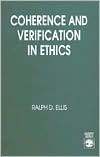

 |

|

The average rating for Coherence and verification in ethics based on 2 reviews is 3.5 stars.
Review # 1 was written on 2020-08-02 00:00:00 Gary Kajiwara Gary KajiwaraSchweitzer critically reviews ethical thought and their relationship to broader philosophical worldviews. Ethical philosophy that focuses only on this world lack a connection to our spiritual being, whereas those worldviews that are preoccupied with the non-material world (e.g., Indian thought, Plato*) have left this world and the body’s interests behind. Schweitzer connects ethics and philosophical worldviews. He seeks union with Infinite Being. That Being is the will-to-live which is the oneness that we share with life. As such, we identify with all of life’s desire to live, to seek pleasure and to avoid pain. We affirmatively support life’s need not just to live, but to “to be full,” for “self perfection,” to be free to be what it needs to be. This identification is Schweitzer’s reverence for life philosophy and its ethical commitment to actively prevent harm and to fight against those cultural and individual practices that lead to harm. This ethical commitment and the resulting union with “the infinite will-to-live” advances civilization because it provides a universal ethical standard and worldview. To commit to life, to all beings, requires a desire, a motivation, to do so. The standard itself does not motivate. Given the variability of human nature, from extreme self-centeredness to the identification with all life that is Schweitzer’s ideal, a major portion of human kind is not going to do the good things that Schweitzer wants. If we want to promote the interest of all of life, we have to fight against those who wish to do it harm. Interestingly, this is consistent with Schweitzer’s ethics even though his universality criterion does not match up with our biological natures and the variability of other-regarding motivation. Schweitzer dismisses nature philosophy (e.g., Darwin and Spencer) as a basis for ethics because he sees it only as self-regarding. He is wrong in that characterization. Schweitzer writes that “The conviction that the welfare of the individual is best secured if the whole body of individuals is also active in promoting the common good has been established by experience in the struggle for existence.” As this statement suggests, a natural ethic can be other-regarding, even though it applies in this characterization just to the group (Darwin’s tribalism). It can go beyond this, however. Elsewhere, Schweitzer writes that, “Darwin in his 'Descent of Man' notices that the feeling of sympathy which is dominant in the social impulse, becomes at last so strong that it comes to include all men, and indeed even animals. But he does not pursue the problem and the significance of this fact any further, and contents himself with establishing the ethics of the human herd.” This suggests that a commitment to the reverence for life principle can be grounded in our biology, even though it is not universally (or even close?) so. *Schweitzer casts Plato’s theory into the world and life negation side of things and ties it to the liberation from this life that is characteristic of Indian thought: “Plato’s ethic of world negation is not an original creation; he takes it over in the Indian setting in which it is offered to him by Orphism and Pythagoreanism.” |
Review # 2 was written on 2016-04-11 00:00:00 Arthur Snow Arthur SnowIt's rare that I'm so inspired by a writer. |
CAN'T FIND WHAT YOU'RE LOOKING FOR? CLICK HERE!!!